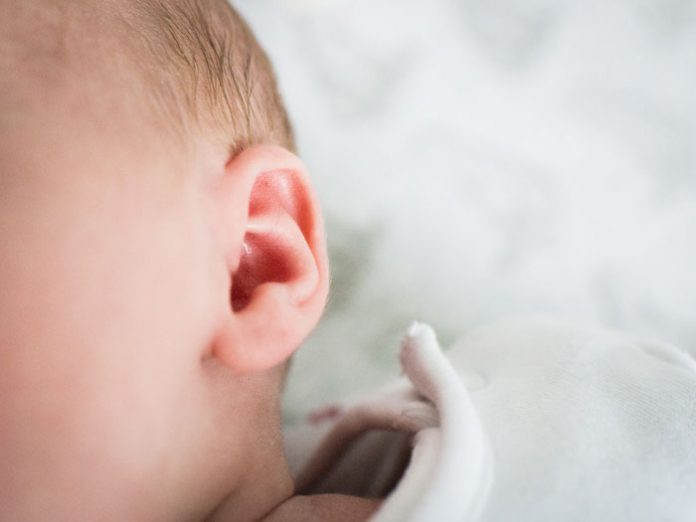This is the story of my son and the hearing disorder with which he was born. Although the challenge was relatively minor in the grand scheme of things, the path we traveled was difficult, as it was filled with uncertainty and anxiety. Yet in retrospect, I feel enriched from this journey, as it afforded me an extra measure of gratitude.
“We were actually on the way to the hospital when you called me last night!” I laughed to my sister, explaining why I hadn’t answered the phone. I was sitting in my hospital bed, less than 12 hours after giving birth to a beautiful baby boy. As we were talking, a nurse entered the room with a large device in tow. She informed me that she would be performing a test on the baby’s hearing. This, as I knew from my other children, was routine hospital procedure. She explained that the latest protocol was to have as many of the required exams as possible done in the room, with Mommy there as a witness. This was new to me, and it would be the first time I would see a baby undergoing a hearing test. What a nice idea, I thought to myself. It’s great to be involved in my baby’s care.
All this went on as I was chatting happily with my sister. She wanted to hear all the details, and I did my best to describe the baby, even though newborns don’t have much of a personal identity just yet.
In the meantime the nurse got to work, applying the necessary wires to my baby’s ears and forehead. When she was done she casually pressed a few buttons, and the screen indicated that the test was in progress. Wanting to be an involved mom, I followed the proceedings with interest, all the while still on the phone.
After a few minutes, however, I began to feel a sense of foreboding. Looking at the screen, I was unsure if I was seeing right. Could it be? As the device kept emitting sound after sound, the screen didn’t always obediently comply with a positive response. I hurried to excuse myself and ended the conversation with my sister. “I have to get off the phone,” I said hurriedly. “I’ll call you The test was coming to an end. Left ear passed, right ear failed. What did this mean? I was desperate for clarification. Even to my untrained eye, I had seen that both ears seemed to have heard some sounds. Okay, and also missed some. Could he hear or not? And if he could, why did he fail the test?
“Not to worry,” the nurse reassured me. “Many newborns don’t pass their initial screening. They’re often born with some fluid in their ear canals, which can negatively affect the result. They’ll test him again tomorrow.”
Although somewhat calmed, I was still a bit uneasy. I couldn’t wait for the next day, when they’d test him again and tell me that everything was fine.
I hadn’t taken it for granted when my other kids had passed their hearing tests as newborns. We knew a family that had a baby who was born deaf. Thankfully, with cochlear implants, this child leads a normal life.
Now what? I tried to assuage my fears and keep my cool, convincing myself that everything would be cleared up the following day. Surely, it was only a fluke.
The next day dawned. This time, a different nurse performed the test. And he failed. In both ears.
“Well, there could still be some fluid in his ears from before he was born,” this nurse was quick to inform me. (I guess one day isn’t enough time for fluid in the ear to dissipate.) “But they’re not going to test him again while you’re still here; they only allow for up to two screenings right after birth. Someone will come by to schedule a follow-up screening to be done a couple of weeks from now.”
Oh. So now they want to wait long enough for the supposed fluid to clear up, I mused. How would I handle two more weeks of uncertainty? Hoping for reassurance, I asked the nurse on her way out, “What percent of babies who don’t pass their hearing tests in the hospital are really fine, and how many are impaired?”
I don’t know if her answer was based on fact or if she was only trying to reassure a nervous new mother. “Oh, 90% of babies who don’t pass at first turn out fine. You’ll come back, they’ll do the test and he’ll be okay.”
I called up my husband to give him an update. I’m not really sure how he took the news, since he was busy being both mom and pop to our other kids at the time. As we have no family history of hearing loss on either side and there were no irregularities during the pregnancy, I guess we assumed it was some kind of fluke. We’d come back at the designated time, he’d pass the test and we’d be vindicated. I was looking forward to coming back up to the maternity ward with my precious bundle and telling the nurses, “See? He was fine all along!”
In retrospect I can see that I was taking his having failed his hearing test as a personal failure. It was as if I’d gotten a report card with a big, fat “F” in one subject. I couldn’t wait to retake the test and get back on the honor roll.
With no other choice, I tried to push all my worry to the back of my mind. In the meantime, I had more immediate concerns. I’d soon be leaving the hospital, going home and making a bris. There would be more than enough to keep me busy without thinking about the looming exam.
Since we were quite certain that the whole situation was a misunderstanding, my husband and I decided to keep it between the two of us and not even tell our parents. Why worry them if everything was really all right?
I threw my energy into caring for my newborn and nursing him every three hours, as instructed by the mohel. My baby was yellow, and I wanted to do whatever I could to enable the bris to be on time. While it was a great distraction, I must admit that I was worried anyway. As sure as I was that he could hear, I found myself thinking about it at odd times. What if he really couldn’t?
Thankfully, his jaundice went away, and the bris was on time.
About a week later we went back to the hospital for the long-awaited retest. As soon as they started setting things up the baby began to protest. He shrieked throughout the examination and failed again, this time in both ears.





















